The diagram shows white light passing through a prism.

Which of the following gives colours in the correct order from A to B?
Red, green, violet
Red, violet, green
Violet, red, green
Violet, green, red
Was this exam question helpful?
Exam code: 0625 & 0972
Select a download format for Light
Select an answer set to view for
Light
The diagram shows white light passing through a prism.

Which of the following gives colours in the correct order from A to B?
Red, green, violet
Red, violet, green
Violet, red, green
Violet, green, red
Choose your answer
Was this exam question helpful?
A teacher has a clock mounted in such a way that students can only see its reflection in a plane mirror.
The diagram shows the reflection of the clock.

What time is shown on the clock?
05:40
07:40
07:20
06:20
Choose your answer
Was this exam question helpful?

An object is placed in front of a mirror. Where is the image formed, and is the image real or virtual?
| Image location | Image type |
A | X | real |
B | X | virtual |
C | Y | real |
D | Y | virtual |
Choose your answer
Was this exam question helpful?
When light passes from a denser material into a less dense material
light slows down and bends toward the normal
light slows down and bends away from the normal
light speeds up and bends toward the normal
light speeds up and bends away from the normal
Choose your answer
Was this exam question helpful?
Identify the correct definition of the critical angle.
The critical angle is the angle of incidence when the angle of refraction is exactly 90° and light is refracted along the boundary
The critical angle is the angle of refraction when the angle of incidence is exactly 90° and light is refracted along the boundary
The critical angle is the angle of incidence when the angle of reflection is exactly 90° and light is reflected along the boundary
The critical angle is the angle of incidence when the angle of refraction is exactly 90° and light is reflected along the boundary
Choose your answer
Was this exam question helpful?
A parallel beam of light is incident on a plane mirror.
Which diagram shows how the beam is reflected by the mirror?
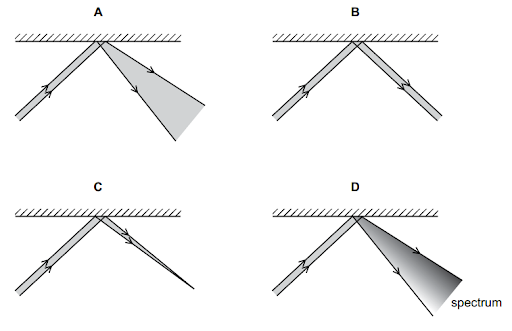
Choose your answer
Was this exam question helpful?
A card is placed in front of a plane mirror so that its label is facing the mirror, as shown.
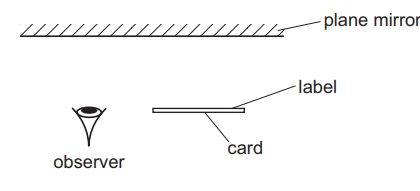
The label is shown.

How does the image of the label formed by the mirror appear to the observer?

Choose your answer
Was this exam question helpful?
Extended Tier Only
A thin converging lens can produce both real and virtual images.
Which row describes a real and a virtual image?
| real image | virtual image |
A | rays converge to form the image | image can be projected onto a screen |
B | rays converge to form the image | image cannot be projected onto a screen |
C | rays diverge to form the image | image can be projected onto a screen |
D | rays diverge to form the image | image cannot be projected onto a screen |
Choose your answer
Was this exam question helpful?
A student draws a diagram to show the directions of a light ray reflecting off a plane mirror.

What are the correct terms for the lines drawn?
normal | incident ray | reflected ray | |
|---|---|---|---|
A | 1 | 2 | 3 |
B | 1 | 3 | 2 |
C | 2 | 1 | 3 |
D | 2 | 3 | 1 |
Choose your answer
Was this exam question helpful?
Which of the diagrams below shows both the correct position of the image, and the correct path the light rays must have taken to the eye?

Choose your answer
Was this exam question helpful?

Which of the images correctly shows the focal length of the thin converging lens?
Choose your answer
Was this exam question helpful?
A physics teacher demonstrates dispersion for her class. She asks the students to draw a diagram of the dispersion.
The diagrams show four examples of what different students drew. One of them is correct. Which one?

Choose your answer
Was this exam question helpful?
Extended tier only
Which diagram correctly shows the formation of a real image on a screen?

Choose your answer
Was this exam question helpful?
The diagram shows a ray of light inside a perspex rod.
Perspex has a critical angle of 42o.

Which row in the table correctly states whether there is any light reflected from the surface, and whether there is any light refracted out of the perspex rod?
| Light reflected? | Light refracted? |
A | yes | yes |
B | yes | no |
C | no | yes |
D | no | no |
Choose your answer
Was this exam question helpful?
A boy sees a fish in a lake.
Which labelled path is taken by the light travelling from the fish to the boy’s eye?
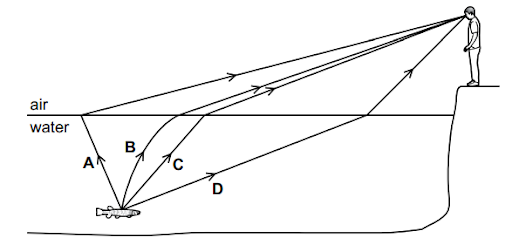
Choose your answer
Was this exam question helpful?
Which diagram shows the formation of a real image of an object O placed in front of a converging lens?
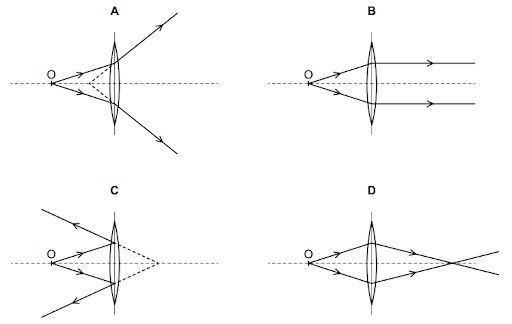
Choose your answer
Was this exam question helpful?
Extended Tier Only
Which statement describes monochromatic light?
light that never diffracts
light that has a single frequency
light that spreads out when shone through a glass prism
light that travels at the same speed in all materials
Choose your answer
Was this exam question helpful?
Extended Tier Only
An object is placed 8.0 cm from a thin converging lens of focal length 5.0 cm.

Which statement about the image formed by the lens is correct?
The image is real and inverted.
The image is real and upright.
The image is virtual and inverted.
The image is virtual and upright.
Choose your answer
Was this exam question helpful?
Extended Tier Only
A ray of light travels through transparent plastic to air.
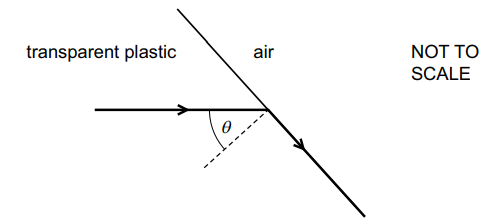
The ray of light enters the air travelling parallel to the surface of the plastic. The refractive index of the plastic is 1.25.
What is angle θ ?
37°
39°
51°
53°
Choose your answer
Was this exam question helpful?
Extended Tier Only
The speed of light in air is 3.0 108 m/s.
The critical angle for light in a transparent plastic material placed in air is 37°.
What is the speed of light in the plastic material?
1.8 108 m/s
2.4 108 m/s
3.8 108 m/s
5.0 108 m/s
Choose your answer
Was this exam question helpful?
Which diagram shows the dispersion of white light by a glass prism?

Choose your answer
Was this exam question helpful?
The diagram shows a ray of light entering a glass block.

Which calculation gives the refractive index of the glass?
Choose your answer
Was this exam question helpful?
Extended tier only
The diagram shows light passing from air into glass. A number of angles have been labelled on the diagram.

Which of the equations could be used to correctly calculate the refractive index, n, of the glass?
Choose your answer
Was this exam question helpful?
Extended tier only
Below is a ray diagram showing the image formed by a thin, converging lens.

Which of the following statements about the image is correct?
The image is virtual and can be seen by eye Y.
The image is inverted and can be seen by eye Y.
The image is real and can be seen by the eye at X.
The image is virtual and can be seen by eye X.
Choose your answer
Was this exam question helpful?
Extended tier only
Light enters a flat water surface at an angle of 27 o.
The refractive index of water is 1.33.
At what angle does the light ray refract?
0.34 o
20.3 o
20.0 o
37.0 o
Choose your answer
Was this exam question helpful?
Extended tier only
A ray of light is shone into a semi-circular glass block so that it makes an angle of 48° with the rear, flat edge of the block as shown.

Calculate the refractive index of the glass.
0.023
1.49
2.38
1.35
Choose your answer
Was this exam question helpful?
Extended tier only
The diagram shows an object positioned close to a thin converging lens (inside the focal distance). Three light rays are shown leaving the object and passing through the lens.

Which row in the table correctly describes the properties of the image?
| location | size | real / virtual |
A | to the left of O | reduced | real |
B | to the right of O | enlarged | virtual |
C | to the left of O | enlarged | virtual |
D | at O | the same as O | real |
Choose your answer
Was this exam question helpful?
The diagram shows a ray of light being totally internally reflected at the boundary between substances A and B.

Which row in the table must be true?
| Angle of incidence | Substance A |
A | greater than critical angle | greater refractive index than B |
B | greater than critical angle | smaller refractive index than B |
C | less than critical angle | greater refractive index than B |
D | less than critical angle | smaller refractive index than B |
Choose your answer
Was this exam question helpful?
The image below shows white light being split into its constituent colours by a glass prism.

Why does a prism cause white light to be dispersed?
Light towards the red end of the spectrum slows down less than light towards the violet end of the spectrum as it moves through the glass
Light towards the red end of the spectrum slows down more than light towards the violet end of the spectrum as it moves through the glass
The frequency of the light towards the red end decreases more than the frequency of light towards the violet end of the spectrum
The frequency of the light towards the violet end decreases more than the frequency of light towards the red end of the spectrum
Choose your answer
Was this exam question helpful?
An object is placed in front of a converging lens. The lens has a focal length f.
In which labelled position should the object be placed in order to produce a real image that is smaller than the object?
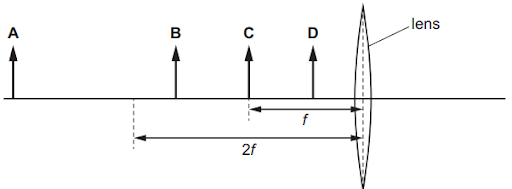
Choose your answer
Was this exam question helpful?
An object O is placed at point P near to a thin converging lens. The diagram shows three rays from the top of O passing through the lens. Each point F is one focal length from the centre of the lens. Each point 2F is two focal lengths from the centre of the lens.
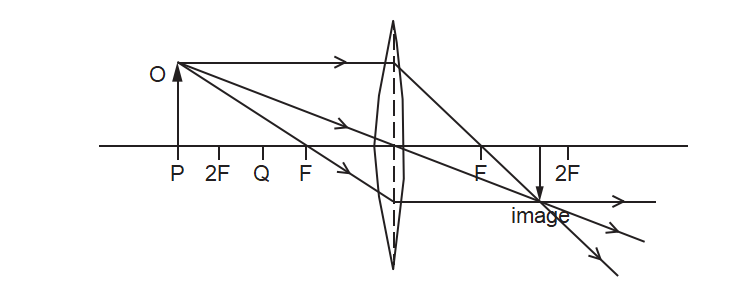
The object O is moved to point Q on the diagram.
Which type of image is produced when the object O is at point Q?
inverted and the same size as the object
inverted and enlarged
upright and the same size as the object
upright and enlarged
Choose your answer
Was this exam question helpful?